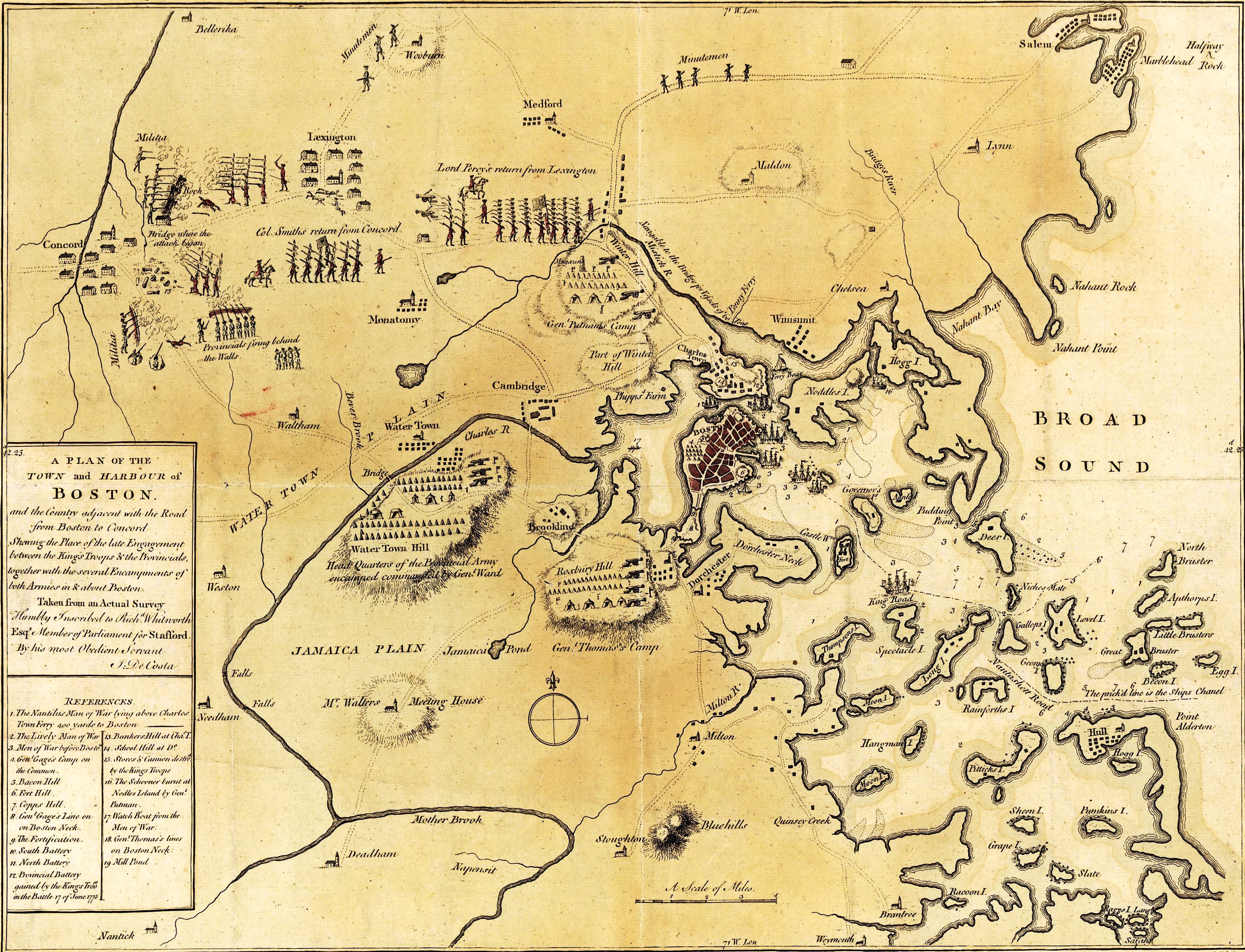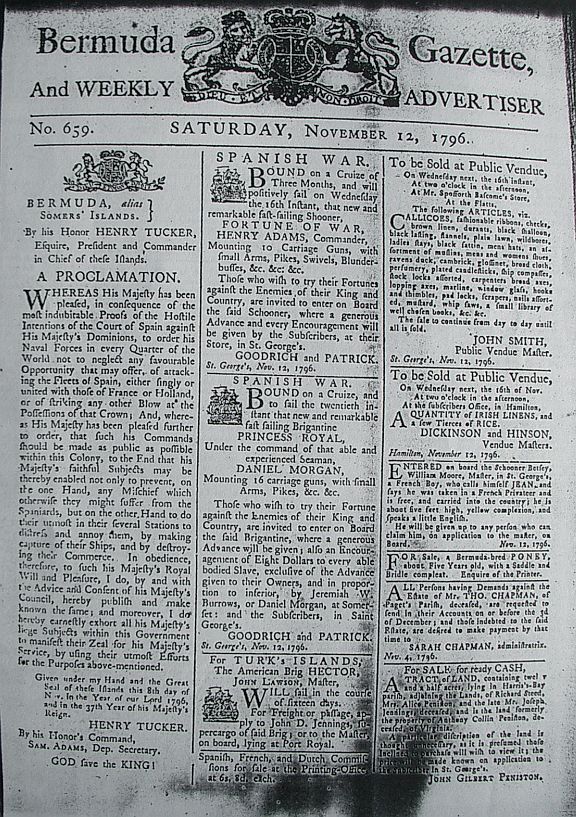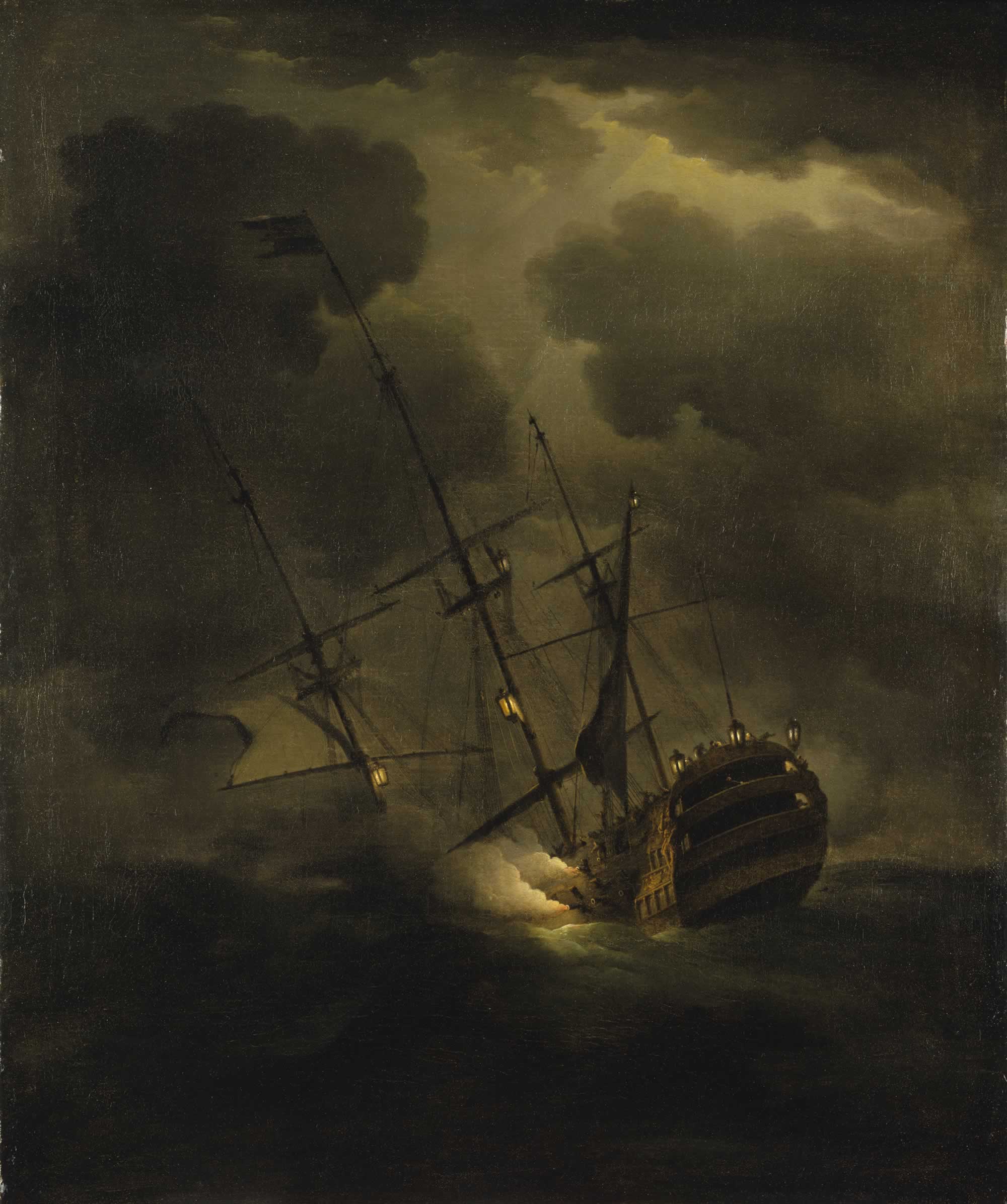|
George Bruere Jr.
George Bruere Jr. was a British politician and soldier who served as Governor of Bermuda from 1780-1782. He was the son of George James Bruere, the longest-reigning Governor in Bermudian history. A staunch loyalist, Bruere was despised, and eventually deposed, for his punitive action against the Bermudian merchant class, who broadly supported the Thirteen Colonies in the American Revolution. Biography George Bruere Jr. was born in 1744 in England. His father was George James Bruere, an army officer who in 1764, was appointed as the Governor of Bermuda. George Jr. also served in the British Army, seeing action at the Battle of Bunker Hill where he was wounded. When his father died in 1780, Bruere Jr. surmised that it was from the stress of running the tumultuous colony of Bermuda, which had been facing plagues, famines, and interior strife throughout the American Revolution. Bruere was appointed to succeed his father in 1780. As Governor, Bruere Jr. increased the British nava ... [...More Info...] [...Related Items...] OR: [Wikipedia] [Google] [Baidu] |
Governor Of Bermuda
The governor of Bermuda (officially Governor and Commander-in-Chief of the Somers Isles (alias the Islands of Bermuda)) is the representative of the British monarch in the British overseas territory of Bermuda. For the purposes of this article, ''Governor of Bermuda'' refers to the local office, although this was originally a ''Lieutenant-Governorship'' (''"Lieutenant Governor and Commander-in-Chief of Our Islands in America commonly called or known by the name of the Bermuda or Summer (Sic#Conventional use, sic) Islands"''; the ''Lieutenant-Governor of Bermuda'' was re-titled ''Governor of Bermuda'' in 1738), which – like the Lieutenant-Governorship of the Jamestown colony – was subordinate to the actual Governor located in England. For a period following the 1783 independence of those continental colonies that were to become the United States of America, the remaining continental colonies, Bermuda and the Bahamas were grouped together as British North America, and the c ... [...More Info...] [...Related Items...] OR: [Wikipedia] [Google] [Baidu] |
George James Bruere
Lieutenant-Colonel George James Bruere ( – 10 September 1780) was a British Army officer and colonial administrator who served as governor of Bermuda from 1764 until his death in 1780. Of all Bermuda's governors since 1612, his term of office was the longest. He had a difficult time during the American Revolutionary War and is thought to have died of chronic stress caused by the interplay of Bermudians and American rebels. Life Born about 1721, on 17 July 1743 Bruere married Elizabeth Neale, daughter of Richard Neale by his marriage to Anne Pendock, in St Mary's Church, Nottingham, England. After an early career as a British Army officer, Bruere was appointed Governor of Bermuda in 1764.Michael J. Jarvis, ''In the eye of all trade: Bermuda, Bermudians, and the Maritime Atlantic World, 1680–1783'' (2010), p. 390: "Plate 23 Portrait of Governor George James Bruere, attributed to John Russell, RA, n.d. A former British Army officer, Bruere served as Bermuda's governor between ... [...More Info...] [...Related Items...] OR: [Wikipedia] [Google] [Baidu] |
Thirteen Colonies
The Thirteen Colonies were the British colonies on the Atlantic coast of North America which broke away from the British Crown in the American Revolutionary War (1775–1783), and joined to form the United States of America. The Thirteen Colonies in their traditional groupings were: the New England Colonies (New Hampshire, Massachusetts, Rhode Island, and Connecticut); the Middle Colonies ( New York, New Jersey, Pennsylvania, and Delaware); and the Southern Colonies (Maryland, Virginia, North Carolina, South Carolina, and Georgia). These colonies were part of British America, which also included territory in The Floridas, the Caribbean, and what is today Canada. The Thirteen Colonies were separately administered under the Crown, but had similar political, constitutional, and legal systems, and each was dominated by Protestant English-speakers. The first of the colonies, Virginia, was established at Jamestown, in 1607. Maryland, Pennsylvania, and the New England Colon ... [...More Info...] [...Related Items...] OR: [Wikipedia] [Google] [Baidu] |
American Revolution
The American Revolution (1765–1783) was a colonial rebellion and war of independence in which the Thirteen Colonies broke from British America, British rule to form the United States of America. The revolution culminated in the American Revolutionary War, which was launched on April 19, 1775, in the Battles of Lexington and Concord. Leaders of the American Revolution were Founding Fathers of the United States, colonial separatist leaders who, as British subjects, initially Olive Branch Petition, sought incremental levels of autonomy but came to embrace the cause of full independence and the necessity of prevailing in the Revolutionary War to obtain it. The Second Continental Congress, which represented the colonies and convened in present-day Independence Hall in Philadelphia, formed the Continental Army and appointed George Washington as its commander-in-chief in June 1775, and unanimously adopted the United States Declaration of Independence, Declaration of Independence ... [...More Info...] [...Related Items...] OR: [Wikipedia] [Google] [Baidu] |
Battle Of Bunker Hill
The Battle of Bunker Hill was fought on June 17, 1775, during the Siege of Boston in the first stage of the American Revolutionary War. The battle is named after Bunker Hill in Charlestown, Boston, Charlestown, Massachusetts, which was peripherally involved. It was the original objective of both the colonial and British troops, though the majority of combat took place on the adjacent hill, which became known as Breed's Hill. On June 13, 1775, the leaders of the colonial forces besieging Boston learned that the British were planning to send troops out from the city to fortify the unoccupied hills surrounding the city, which would give them control of Boston Harbor. In response, 1,200 colonial troops under the command of William Prescott stealthily occupied Bunker Hill and Breed's Hill. They constructed a strong redoubt on Breed's Hill overnight, as well as smaller fortified lines across the Charlestown Peninsula. By daybreak of June 17, the British became aware of the presen ... [...More Info...] [...Related Items...] OR: [Wikipedia] [Google] [Baidu] |
Privateering
A privateer is a private person or vessel which engages in commerce raiding under a commission of war. Since Piracy, robbery under arms was a common aspect of seaborne trade, until the early 19th century all merchant ships carried arms. A sovereign or delegated authority issued commissions, also referred to as Letter of marque, letters of marque, during wartime. The commission empowered the holder to carry on all forms of hostility permissible at sea by the usages of war. This included attacking foreign vessels and taking them as prizes and taking crews prisoner for exchange. Captured ships were subject to condemnation and sale under prize (law), prize law, with the proceeds divided by percentage between the privateer's sponsors, shipowners, captains and crew. A percentage share usually went to the issuer of the commission (i.e. the sovereign). Most colonial powers, as well as other countries, engaged in privateering. Privateering allowed sovereigns to multiply their naval force ... [...More Info...] [...Related Items...] OR: [Wikipedia] [Google] [Baidu] |
Henry Tucker (Bermudian Politician, Born 1742)
Henry Tucker (1742-1800) was a Bermudian politician, and a member of a family that had been prominent in Bermuda since the 1616 appointment of Captain Daniel Tucker as Governor of Bermuda. Henry Tucker was the President of the Governor's Council of the British colony of Bermuda (which had combined the roles of a Cabinet and an Upper House to the House of Assembly of Bermuda) from 1775 to 1807. Prominent men at that time filled a variety of civil and military roles by appointment, and Tucker was also appointed the Colonial Secretary of Bermuda and Provost Marshal General of Bermuda after the resignation of W. O'Brien from those positions in 1785. He was acting Governor of Bermuda in 1796, pending the arrival of new Governor William Campbell. Campbell died almost immediately upon arrival and Tucker resumed the acting Governorship from 1796 to 1798, and again from 1803 to 1805, and in 1806. Henry's father was Henry Tucker of The Grove, at various times a Member of the Council, of t ... [...More Info...] [...Related Items...] OR: [Wikipedia] [Google] [Baidu] |
William Browne (judge)
William Browne (February 27, 1737 – February 13, 1802) was a justice of the Massachusetts Superior Court of Judicature (the highest court of the Province of Massachusetts Bay) from 1774 to 1775, and Governor of Bermuda from 1782 to 1788. Early life Born in Salem, Massachusetts on February 27, 1737, son of Samuel Browne Jr. and Catherine Winthrop. He was the part of the prominent Browne family of Salem, and through his mother's side, he was descended from four colonial governors, including John Winthrop. Browne attended Harvard College and was classmate and friend of John Adams. His college portrait was painted by notable artist Joseph Blackburn. He graduated in 1755 and was valedictorian of his class. Browne married Ruth Wanton, daughter of Rhode Island Governor Joseph Wanton. In 1762 he was appointed as collector of the port of Salem, a position he held until 1766 when he was dismissed for sympathizing with colonist on the Sugar Act. William Browne was also a colonel of th ... [...More Info...] [...Related Items...] OR: [Wikipedia] [Google] [Baidu] |
Massachusetts
Massachusetts ( ; ), officially the Commonwealth of Massachusetts, is a U.S. state, state in the New England region of the Northeastern United States. It borders the Atlantic Ocean and the Gulf of Maine to its east, Connecticut and Rhode Island to its south, New Hampshire and Vermont to its north, and New York (state), New York to its west. Massachusetts is the List of U.S. states and territories by area, sixth-smallest state by land area. With a 2024 U.S. Census Bureau-estimated population of 7,136,171, its highest estimated count ever, Massachusetts is the most populous state in New England, the List of U.S. states and territories by population, 16th-most-populous in the United States, and the List of states and territories of the United States by population density, third-most densely populated U.S. state, after New Jersey and Rhode Island. Massachusetts was a site of early British colonization of the Americas, English colonization. The Plymouth Colony was founded in 16 ... [...More Info...] [...Related Items...] OR: [Wikipedia] [Google] [Baidu] |
Great Britain
Great Britain is an island in the North Atlantic Ocean off the north-west coast of continental Europe, consisting of the countries England, Scotland, and Wales. With an area of , it is the largest of the British Isles, the List of European islands by area, largest European island, and the List of islands by area, ninth-largest island in the world. It is dominated by a maritime climate with narrow temperature differences between seasons. The island of Ireland, with an area 40 per cent that of Great Britain, is to the west – these islands, along with over List of islands of the British Isles, 1,000 smaller surrounding islands and named substantial rocks, comprise the British Isles archipelago. Connected to mainland Europe until 9,000 years ago by a land bridge now known as Doggerland, Great Britain has been inhabited by modern humans for around 30,000 years. In 2011, it had a population of about , making it the world's List of islands by population, third-most-populous islan ... [...More Info...] [...Related Items...] OR: [Wikipedia] [Google] [Baidu] |
Governors Of Bermuda
The governor of Bermuda (officially Governor and Commander-in-Chief of the Somers Isles (alias the Islands of Bermuda)) is the representative of the British monarch in the British overseas territory of Bermuda. For the purposes of this article, ''Governor of Bermuda'' refers to the local office, although this was originally a ''Lieutenant-Governorship'' (''"Lieutenant Governor and Commander-in-Chief of Our Islands in America commonly called or known by the name of the Bermuda or Summer (Sic#Conventional use, sic) Islands"''; the ''Lieutenant-Governor of Bermuda'' was re-titled ''Governor of Bermuda'' in 1738), which – like the Lieutenant-Governorship of the Jamestown colony – was subordinate to the actual Governor located in England. For a period following the 1783 independence of those continental colonies that were to become the United States of America, the remaining continental colonies, Bermuda and the Bahamas were grouped together as British North America, and the c ... [...More Info...] [...Related Items...] OR: [Wikipedia] [Google] [Baidu] |
1744 Births
Events January–March * January 6 – The Royal Navy ship ''Bacchus'' engages the Spanish Navy privateer ''Begona'', and sinks it; 90 of the 120 Spanish sailors die, but 30 of the crew are rescued. * January 24 – The Dagohoy rebellion in the Philippines begins, with the killing of Father Giuseppe Lamberti. * February 22–February 23, 23 – Battle of Toulon (1744), Battle of Toulon: The British fleet is defeated by a joint Franco-Spanish fleet. * February 27 – Violent storms frustrate a Planned French invasion of Britain (1744), planned French invasion of Britain. * March 1 (approximately) – The Great Comet of 1744, one of the brightest ever seen, reaches perihelion. * March 13 – The British ship ''Betty'' capsizes and sinks off of the Gold Coast (modern-day Ghana) near Anomabu. More than 200 people on board die, although there are a few survivors. * March 15 – France declares war on Great Britain. April–June * ... [...More Info...] [...Related Items...] OR: [Wikipedia] [Google] [Baidu] |







